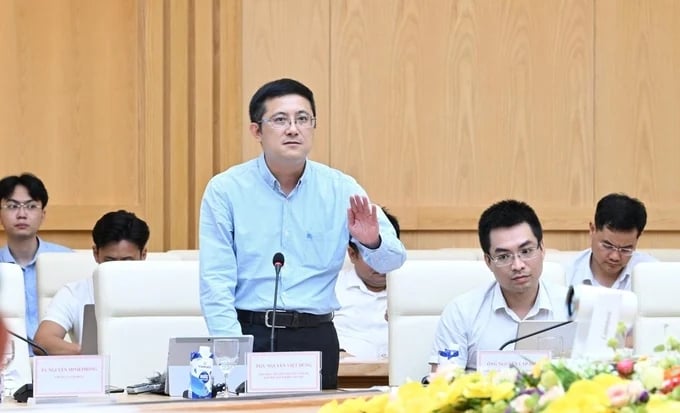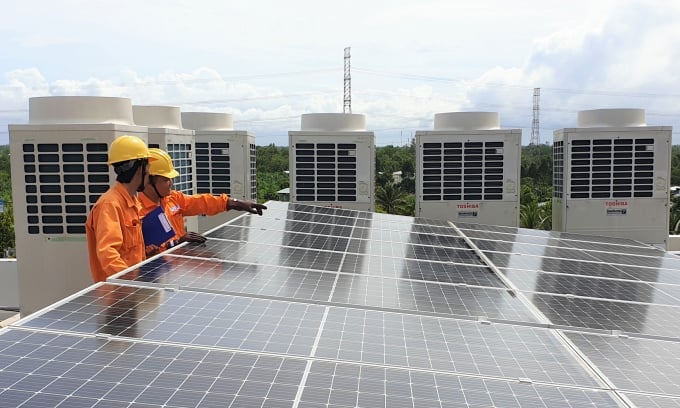November 26, 2025 | 23:10 GMT +7
November 26, 2025 | 23:10 GMT +7
Hotline: 0913.378.918
November 26, 2025 | 23:10 GMT +7
Hotline: 0913.378.918

Associate Professor Dr. Nguyen Viet Dung, Vice Rector of the Faculty of Mechanical Engineering at Hanoi University of Science and Technology.
Associate Professor Dr. Nguyen Viet Dung, Vice Rector of the Faculty of Mechanical Engineering at Hanoi University of Science and Technology, pointed out that solar power has both advantages and disadvantages.
On the positive side, it is a source of primary energy (solar radiation) that can be considered almost limitless, with low installation and production costs. Moreover, rooftop solar power requires less installation space and utilizes existing building roofs.
However, solar power has low efficiency and is highly dependent on weather conditions. The peak power output of solar panels usually occurs around midday and early afternoon, which does not coincide with the peak demand for electricity (usually from 5 pm to 8 pm).
"The system may be generating close to 100% of its installed capacity, but just a passing cloud or a sudden rain shower can reduce the power output to near zero in just a few minutes," Mr Dung said.
According to the Vice Rector of the Faculty of Mechanical Engineering, Vietnam currently faces some barriers in energy storage technology, which has relatively high costs. Therefore, the development of solar power must go hand in hand with restructuring traditional energy sources such as thermal and hydroelectric power and enhancing the adaptability of the power system.
In recent years, Vietnam has implemented many programs and plans to promote the development of renewable energy sources, aiming to achieve net zero emissions by 2050. As a result, most thermal power plants are operating at non-load conditions but must be ready to go online to compensate for peak hours. Mr. Dung commented that this leads to low efficiency, high electricity production costs, and reduced equipment durability.
Regarding the appropriate development of solar power in line with the overall national power planning, energy experts cite the example of China. Although China accounts for more than one-third of the world's solar power generation, it only aims to increase the proportion of installed solar power capacity to 20% by 2030.
Similarly, Japan, a leader in green energy transition, had solar power (including rooftop solar power) accounting for over 20% of total installed capacity by 2021.
In contrast, from 2018 to 2022 in Vietnam, the proportion of total installed solar power capacity compared to other power sources in the system increased from less than 1% to over 20%. "This rapid growth has put tremendous pressure on the entire power system", Mr. Dung emphasized.

Rooftop solar self-generation and consumption are encouraged to be developed in industrial zones.
In April 2024, the Ministry of Industry and Trade introduced a draft decree outlining mechanisms and policies to encourage the development of rooftop solar self-generation and consumption. In this draft, it is proposed that if not connected to the national grid, rooftop solar self-consumption systems can be developed without a capacity limit; whereas if connected to the grid, the generated electricity will be accounted for at a price of VND 0 within a limited capacity of 2,600MW.
Associate Professor Dr Nguyen Viet Dung, Vice Rector of the Faculty of Mechanical Engineering at Hanoi University of Science and Technology, believes that encouraging the development of rooftop solar self-generation and consumption aims to reduce the pressure to increase power sources while ensuring the electricity demand of society, especially during hot seasons, and mobilizing social resources to participate in the electricity market.
"The connection of rooftop solar systems to the national grid should only be considered as a supplement when there is a shortage of solar power. In the next five years, we should consider the issue of buying and selling so that all stakeholders can adjust", Mr. Dung expressed his viewpoint.
Furthermore, the lecturer from Hanoi University of Science and Technology suggests that the development of rooftop solar self-generation and consumption in industrial zones should be encouraged based on actual conditions to avoid speculation and policy-driven overheating, which could lead to an imbalance in the electricity supply and exert pressure on electricity prices.
Drawing from the experiences of North Asian countries, Australia, and ASEAN, leaders at the Faculty of Mechanical Engineering believe that promotion should be encouraged while avoiding overheating. Additionally, the state support mechanism should gradually reduce subsidies for excess rooftop solar power purchases, transition to market regulation, or indirect support measures.
"Policies supporting rooftop solar can include preferential loans and income tax reductions. Moreover, regulatory agencies can provide support through carbon credit trading markets, and renewable energy certificates. These are also issues that contribute to sustainability", Mr Dung expressed.
Vietnam is currently piloting the carbon credit trading market, scheduled to operate officially in 2028, along with relevant legislative documents. Mr Dung hopes that carbon credits can provide a boost to the development of rooftop solar in the right direction, ensuring policy equity for all stakeholders.
Translated by Hoang Duy

(VAN) The Mekong River Commission adopts the 2026 - 2030 Strategic Plan with a people-centered approach.
/2025/11/26/1720-1-200855_132.jpg)
(VAN) Viet Nam and Japan have many conditions to expand cooperation on climate change adaptation, particularly in disaster risk management based on advanced technologies.

(VAN) The strong development of digital technology and artificial intelligence is opening up opportunities to transform science and technology into a 'Magic eye' for disaster forecasting and early warning.

Applying vaccines and proactive disease prevention helps pig herds stay healthy, maintain productivity, reduce risks, and decrease reliance on antibiotics in modern livestock farming.

(VAN) Many advanced agricultural technologies and products were shared at the Viet Nam - South Korea Agricultural Technology Introduction, Trade Promotion, and Connection Seminar 2025.

(VAN) Minister Tran Duc Thang hopes to strengthen connections and exchanges with China in agriculture and environment sector through the Embassy of Vietnam in Beijing.

(VAN) After 50 years of strategic cooperation, Viet Nam and UNICEF remain committed to promoting fair and inclusive development for all children in the digital future.